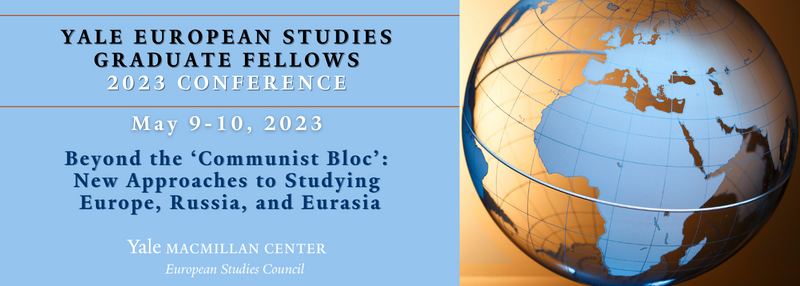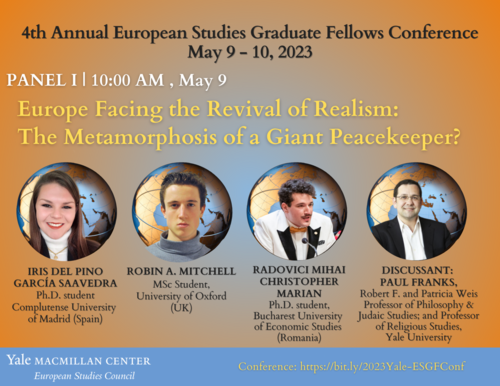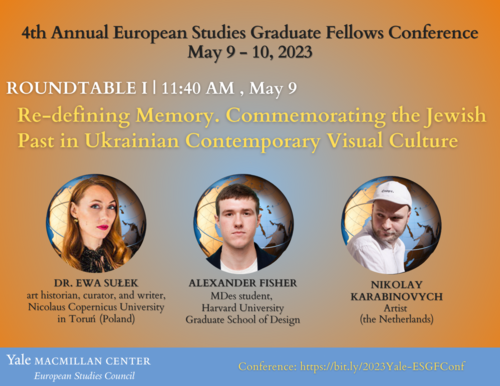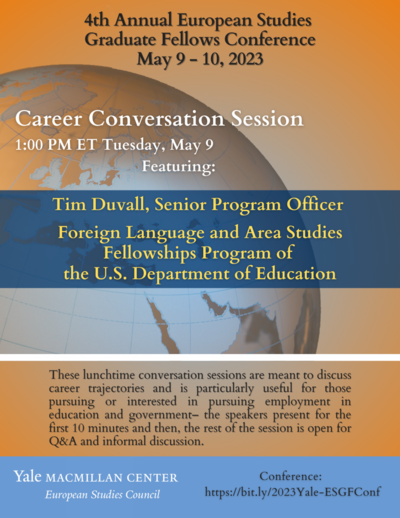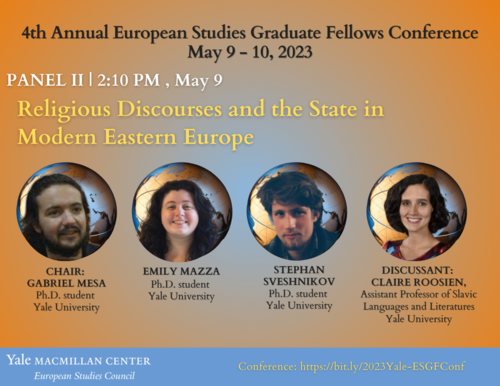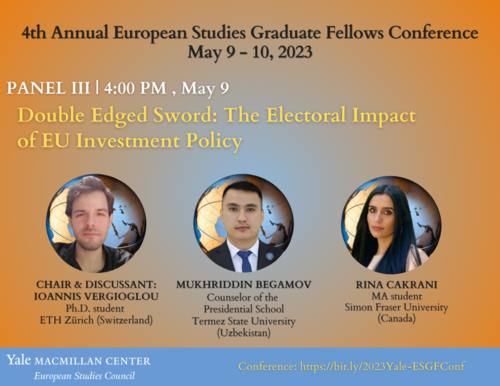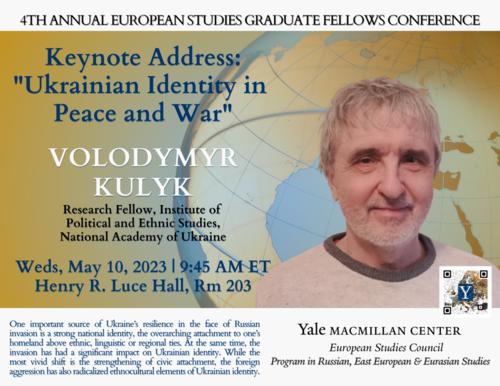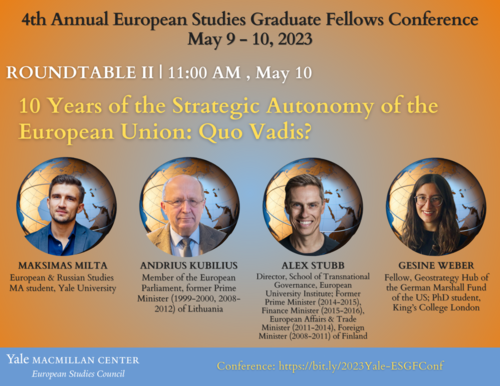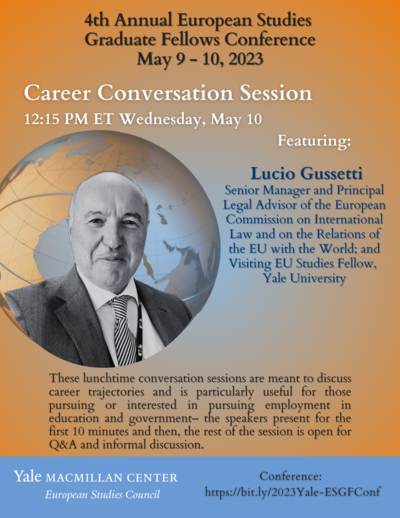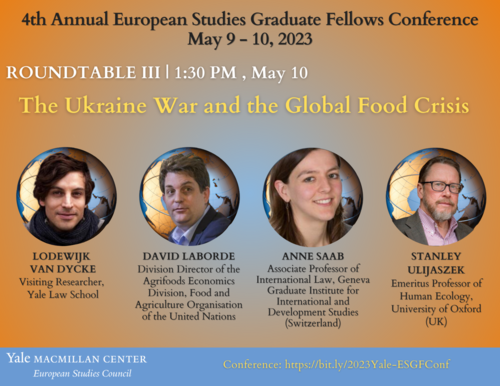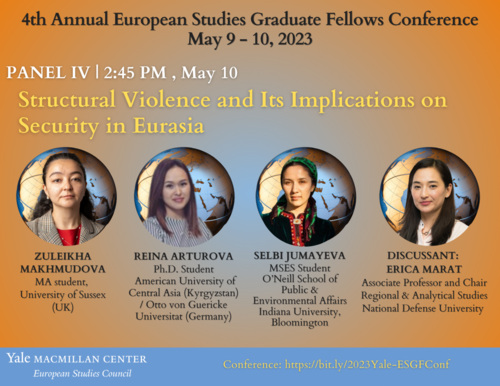May 9 to 10, 2023
The European Studies Council (ESC) of the MacMillan Center for International and Area Studies at Yale University welcomes you to the 4th annual international interdisciplinary conference of the European Studies Graduate Fellows on
“Beyond the ‘Communist Bloc’: New Approaches to Studying Europe, Russia, and Eurasia”
In celebration of Europe Day, a hybrid-format conference will be held at Yale University. This Conference will bring together graduate students from across disciplines to discuss the most pressing challenges facing Europe, Russia, and Eurasia today.
Conference Schedule
Location: Henry R. Luce Hall, Rm 203, (2nd fl.) 34 Hillhouse Ave.
Register to attend on Zoom: https://bit.ly/GradFellows23ConfZoom
Tuesday, May 9, 2023
9:00 AM Breakfast
9:45 AM Welcome Remarks by Professor Marci Shore, Yale University
10:00 - 11:30 AM Panel 1: Europe Facing the Revival of Realism: the Metamorphosis of a Giant Peacekeeper?
- Chair: Iris del Pino García Saavedra, Ph.D. student, Complutense University of Madrid (Spain)
- Discussant: Professor Paul Franks,Yale University
- Iris del Pino García Saavedra, Ph.D. student, Complutense University of Madrid (Spain), “Analysing the early consequences and challenges for the EU of the revival of realism”
- Robin A. Mitchell, MSc Student, University of Oxford (UK), “Russians beyond borders: Neo-Gramscian Theory in the Time of War”
- Radovici Mihai Christopher Marian, Ph.D. student, Bucharest University of Economic Studies (Romania), “A renewed axis mundi within the old continent: The European Union as a post-nationalist progressive realism global power”
11:40 AM - 12:40 PM ROUNDTABLE I: Re-defining Memory. Commemorating the Jewish Past in Ukrainian Contemporary Visual Culture
- Chair & Moderator: Dr. Ewa Sułek, Nicolaus Copernicus University in Toruń (Poland), “Perpetrator’s gaze. Contemporary perspective on the 1941 Lviv pogroms in Nikita Kadan’s ‘Mutilated Myth’ ”
- Alexander Fisher, MDes student, Harvard University Graduate School of Design, “Entangled Commemoration at Babyn Yar”
- Nikolay Karabinovych, Artist (the Netherlands)
12:40 - 2:10 PM Lunch
- 1:00 - 2:00 PM Career Conversation Session (in-person only)
- Featuring Tim Duvall, Senior Program Officer, Foreign Language and Area Studies Fellowships Program of the U.S. Department of Education
2:10-3:40PM PANEL II: Religious Discourses and the State in Modern Eastern Europe
- Chair: Gabriel Mesa, incoming Ph.D. student (Yale University)
- Discussant: Professor Claire Roosien, Yale University
- Emily Mazza, Ph.D. student, Yale University, “Lithuanian Memorialization of the Holocaust and Navigating Ethnic Divides: A Case Study of Paneriai”
- Stephan Sveshnikov, Ph.D. student, Yale University, “Revolution Within Revolution: Church and Politics at the First Session of the All-Russian Sobor of 1917-1918”
4:00 - 5:30 PM PANEL III: Double Edged Sword: The Electoral Impact of EU Investment Policy
- Chair & Discussant: Ioannis Vergioglou, Ph.D. student, ETH Zürich (Switzerland)
- Mukhriddin Begamov, Counselor of the Presidential School, Termez State University (Uzbekistan), “The Investment Policy of the EU. Is it a Manipulative Mechanism in the EU Elections?”
- Rina Cakrani, MA student, Simon Fraser University (Canada), “The role of EU investment policy in advancing the economic integration in the Western Balkans”
Wednesday, May 10, 2023
9:00 AM Breakfast
9:45 - 10:45 AM Keynote Address by Volodymyr Kulyk, Head Research Fellow at the Institute of Political and Ethnic Studies, National Academy of Sciences of Ukraine
“Ukrainian Identity in Peace and War”
One important source of Ukraine’s resilience in the face of Russian invasion is a strong national identity, the overarching attachment to one’s homeland above ethnic, linguistic or regional ties. At the same time, the invasion has had a significant impact on Ukrainian identity. While the most vivid shift is the strengthening of civic attachment, the foreign aggression has also radicalized ethnocultural elements of Ukrainian identity.
Volodymyr Kulyk is Head Research Fellow at the Institute of Political and Ethnic Studies, National Academy of Sciences of Ukraine. He has also taught at Columbia, Stanford and Yale Universities, Kyiv Mohyla Academy and Ukrainian Catholic University as well as having research fellowships at Harvard, Stanford, Woodrow Wilson Center, University College London, the Institute for Human Sciences in Vienna and other Western scholarly institutions. His research fields include the politics of language, memory and identity as well as political and media discourse in contemporary Ukraine, on which he has widely published in Ukrainian and Western journals and collected volumes. Professor Kulyk is the author of four books, the latest of which is Movna polityka v bahatomovnykh kraïnakh: Zakordonnyi dosvid ta ioho prydatnist’ dlia Ukraïny (Language Policies in Multilingual Countries: Foreign Experience and Its Relevance to Ukraine) that was published in Kyiv in 2021. Currently he is a Petrach visiting fellow at the Institute for European, Russian, and Eurasian Studies, George Washington University.
11:00 AM - 12:00 PM ROUNDTABLE II: “10 Years of the Strategic Autonomy of the European Union: Quo Vadis?”
- Chair & Moderator: Maksimas Milta, MA student, Yale University
- Andrius Kubilius, Member of the European Parliament, former Prime Minister (1999-2000, 2008-2012) of Lithuania
- Professor Alex Stubb, Director of the School of Transnational Governance, European University Institute (Italy); Former Prime Minister (2014-2015), Finance Minister (2015-2016), European Affairs and Trade Minister (2011-2014), Foreign Minister (2008-2011) of Finland
- Gesine Weber, Fellow, Geostrategy Hub of the German Marshall Fund of the US (France); and Ph.D. student, King’s College London (UK)
12:00 - 1:30 PM Lunch
- 12:15 - 1:15 PM Career Conversation Session (in-person only)
- Featuring Lucio Gussetti, Senior Manager and Principal Legal Advisor of the European Commission on International Law and on the Relations of the EU with the World; and Visiting EU Studies Fellow, Yale University
1:30 - 2:30 PM ROUNDTABLE III: The Ukraine War and the Global Food Crisis
- Chair & Moderator: Lodewijk Van Dycke, Visiting Researcher, Yale Law School
- David Laborde, Division Director of the Agrifoods Economics Division, Food and Agriculture Organisation of the United Nations
- Anne Saab, Associate Professor of International Law, Geneva Graduate Institute for International and Development Studies (Switzerland)
- Stanley Ulijaszek, Emeritus Professor of Human Ecology, University of Oxford (UK)
2:45 - 4:15 PM PANEL IV: Structural Violence and Its Implications on Security in Eurasia
- Chair: Zuleikha Makhmudova, MA student, University of Sussex (UK)
- Discussant: Professor Erica Marat, National Defense University (Washington, DC)
- Reina Arturova, Ph.D. Student, American University of Central Asia (Kyrgyzstan) / Otto von Guericke Universitat (Germany), “Post-colonial Approach to Structural Violence Against Ethnic Minorities in Contemporary Central Asia”
- Selbi Jumayeva, MSES Student, O’Neill School of Public and Environmental Affairs at Indiana University, Bloomington, “Environmental (in)security: transboundary boundary objects and governance in Central Asia”
- Zuleikha Makhmudova, MA student, University of Sussex (UK), “January 2022 Protests in Kazakhstan and its implications on security in Eurasia”
4:30 - 6:30 PM Closing Reception & Yale European Studies Council’s End of the Year Reception


